
Education and Information Technologies
Scope & Guideline
Empowering learning with innovative insights.
Introduction
Aims and Scopes
- Integration of Emerging Technologies in Education:
The journal emphasizes the incorporation of advanced technologies such as artificial intelligence, augmented reality, and virtual reality into educational practices, exploring their impact on student engagement and learning outcomes. - Pedagogical Innovations and Methodologies:
It investigates innovative teaching methodologies, including project-based learning, flipped classrooms, and gamification, which aim to enhance student learning experiences and outcomes. - Assessment and Evaluation in Digital Learning Environments:
The journal addresses the assessment of learning outcomes in digital contexts, focusing on how technology can inform and improve assessment practices, including automated feedback systems and learning analytics. - Digital Literacy and Competence Development:
There is a consistent focus on developing digital literacy among educators and students, ensuring that they are equipped with the necessary skills to thrive in increasingly digital learning environments. - Social and Emotional Aspects of Learning with Technology:
The journal explores the social and emotional dimensions of learning, such as how technology affects student motivation, engagement, and well-being.
Trending and Emerging
- Artificial Intelligence in Education:
There is an increasing trend in exploring the use of artificial intelligence (AI) technologies in educational settings, including personalized learning, automated feedback systems, and AI-driven learning analytics. - Gamification and Game-Based Learning:
Research on gamification and game-based learning strategies is gaining momentum, highlighting their effectiveness in enhancing student engagement and motivation. - Learning Analytics and Data-Driven Decision Making:
Emerging themes focus on the use of learning analytics to inform teaching practices and improve student outcomes, emphasizing the role of data in educational decision-making. - Social Emotional Learning (SEL) in Digital Contexts:
There is a growing emphasis on the social emotional aspects of learning, particularly how technology can support SEL initiatives and foster positive learning environments. - Hybrid and Blended Learning Models:
The journal is increasingly focusing on hybrid and blended learning models, particularly in response to the challenges posed by the COVID-19 pandemic, exploring best practices and pedagogical strategies for effective implementation.
Declining or Waning
- Traditional Teaching Methods:
There is a noticeable decline in publications focusing on traditional teaching methods, as the emphasis has shifted towards innovative and technology-enhanced pedagogies. - Standalone Technological Tools:
The journal has moved away from discussing standalone technological tools in favor of integrated systems that combine various educational technologies to support holistic learning experiences. - Generic Digital Literacy:
The focus is shifting from generic digital literacy skills to more specific competencies related to emerging technologies and their application in educational contexts. - Passive Learning Approaches:
Research on passive learning approaches, such as lecture-based teaching without interaction, has decreased, as the journal increasingly emphasizes active learning strategies that engage students in the learning process. - Non-Interactive Learning Environments:
There is a waning interest in non-interactive learning environments, as the journal emphasizes the importance of interaction and collaboration in digital learning settings.
Similar Journals

ETR&D-EDUCATIONAL TECHNOLOGY RESEARCH AND DEVELOPMENT
Innovating Education: Bridging Theory and PracticeETR&D - Educational Technology Research and Development, published by Springer, is a premier journal dedicated to advancing the field of educational technology through rigorous research and development. With a history dating back to 1957, it has established itself as a leading resource for scholars and practitioners, maintaining a remarkable Q1 ranking in Education as of 2023, and standing at an impressive 41st out of 1543 in the Scopus rankings for Social Sciences - Education, placing it in the 97th percentile. This journal aims to bridge the gap between theory and practice, offering in-depth insights into the latest innovations and methodologies in educational technology. As a vital resource for researchers, educators, and technology developers, ETR&D highlights the interplay of technology, pedagogy, and learning environments, driving the evolution of educational practices in a digital era. Although not an open access journal, it provides comprehensive access options for institutional and individual subscribers, ensuring that key findings reach a broad audience. Discover the future of education through ETR&D's influential publications.

Innoeduca-International Journal of Technology and Educational Innovation
Fostering Global Dialogue on Educational InnovationInnoeduca - International Journal of Technology and Educational Innovation, published by the esteemed Universidad de Málaga, stands at the forefront of the rapidly evolving intersection of technology and education. With an E-ISSN of 2444-2925, this open-access journal has proudly disseminated cutting-edge research and innovative practices in educational technology since 2015. It aims to empower researchers, educators, and policymakers by providing a platform for sharing knowledge, insights, and advancements that enhance the learning experience through technology. The journal covers a wide array of topics, including digital learning environments, instructional design, and the impact of emerging technologies on education. By offering free access to its articles, Innoeduca fosters a global dialogue among professionals and students alike, making a significant contribution to the field of education innovation and technology.

Journal of E-Learning and Knowledge Society
Exploring the Future of Learning in a Connected WorldJournal of E-Learning and Knowledge Society is a premier academic journal dedicated to the exploration and advancement of e-learning and knowledge dissemination in contemporary society. Published by the SOC ITALIANA E-LEARNING, this journal has established itself as a vital resource for researchers and practitioners since its inception in 2006. With an open access model adopted in 2007, the journal promotes the free exchange of ideas and research findings, ensuring wide accessibility to academic contributions in this rapidly evolving field. The journal is indexed in notable databases and holds a Q3 classification in both Computer Science Applications and Education, reflecting its significant role in the advancement of educational technologies. Furthermore, its Scopus ranks highlight its relevance within the educational and computer science communities. Based in Rome, Italy, the Journal of E-Learning and Knowledge Society aims to bridge the gap between theory and practice, providing a platform for innovative research that shapes the future of digital learning environments. Whether you are a researcher, educator, or student, this journal offers valuable insights and developments in e-learning that are critical to navigating today’s knowledge society.
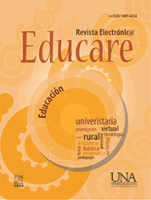
Revista Electronica Educare
Leading the Way in Contemporary Educational Discourse.Revista Electronica Educare, published by UNIV NACL, CIDE in Costa Rica, stands as a vital resource in the field of education, contributing significantly to the discourse since its inception in 2001. As an Open Access journal, it promotes the dissemination of educational research globally, ensuring that valuable findings are accessible to a wider audience without financial barriers. With an increasing impact factor reflected in its current categorization in the Q3 quartile for education sciences and a Scopus rank of #989 among 1543 in Social Sciences, the journal is recognized for its quality and relevance in contemporary educational studies. The journal covers a broad spectrum of topics within the educational landscape until 2024, making it an essential platform for researchers, professionals, and students eager to explore innovative pedagogical practices and share their insights with the academic community. As it continues to evolve and flourish, Revista Electronica Educare invites contributors and readers alike to engage with the cutting-edge of educational research.
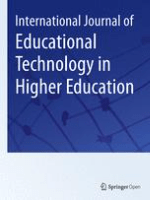
International Journal of Educational Technology in Higher Education
Shaping the future of education through technology.The International Journal of Educational Technology in Higher Education, published by Springer, stands as a pivotal platform for the dissemination of innovative research and findings in the field of educational technology. Since its inception in 2016, this open-access journal has been dedicated to enhancing the intersection of technology and education, providing scholars and practitioners with cutting-edge insights that shape contemporary educational practices. With a robust ISSN of 2365-9440, the journal has garnered impressive accolades, ranking in the top quartile (Q1) in both Computer Science Applications and Education disciplines as of 2023. Furthermore, it holds an esteemed position within the Scopus rankings, occupying rank #6 out of 1543 in Social Sciences Education, and #20 out of 817 in Computer Science Applications, highlighting its influential reach and scholarly impact. The journal especially focuses on how emerging technologies are transforming higher education, fostering a collaborative approach amongst researchers, educators, and professionals. By making its content openly accessible, it aims to bridge knowledge gaps and support the advancement of effective educational practices worldwide.
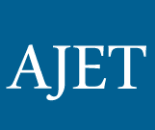
Australasian Journal of Educational Technology
Pioneering Research for a Digital Learning RevolutionAustralasian Journal of Educational Technology (AJET), a premier peer-reviewed journal published by the Australasian Society for Computers in Learning in Tertiary Education (ASCILITE), has been at the forefront of advancements in educational technology since its inception in 1985. With an impressive Q1 ranking in both Education and E-learning categories for 2023, this open access journal (ISSN: 1449-3098, E-ISSN: 1449-5554) serves as a vital platform for researchers, practitioners, and students aiming to disseminate innovative research and practices in the use of technology for teaching and learning in tertiary education. Based in Australia and accessible to a global audience, AJET is committed to enhancing educational outcomes through the integration of technology, fostering a vibrant community of scholarship and collaboration among educators and industry professionals. With its high impact ranking (Rank #105/1543 in Social Sciences - Education), AJET remains a significant contributor to the scholarly discussion on effective learning environments in an increasingly digital world.
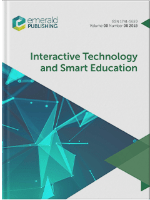
Interactive Technology and Smart Education
Exploring the synergy of technology and education for a smarter tomorrow.Interactive Technology and Smart Education is a leading academic journal published by EMERALD GROUP PUBLISHING LTD, dedicated to exploring the dynamic intersection of technology and education. With a robust impact factor signifying its significant contributions to the field, this journal consistently ranks in the Q1 quartile in categories such as Computer Science (Miscellaneous), Education, and E-learning, reflecting its prestige and wide-ranging influence. A staple for researchers, educators, and industry professionals, the journal addresses innovative practices and developments in interactive technologies that enhance teaching and learning experiences. Operating from its base in the United Kingdom, the journal spans nearly two decades of impactful publishing, featuring high-quality research that plays a crucial role in shaping the future of education through technology. Scholars seeking to stay at the forefront of this evolving field are encouraged to contribute and engage with the journal's pioneering work.

Technology Knowledge and Learning
Connecting Theory and Practice in the Digital AgeTechnology Knowledge and Learning, published by SPRINGER, stands as a pivotal platform in the realms of computational theory, computer science, education, and human-computer interaction. With an impressive impact factor reflecting its reputation, this journal has consistently ranked in the Q1 quartile across multiple categories as of 2023, including Computational Theory and Mathematics, Education, and Engineering. Spanning a timeline from 2011 to 2024, it serves as an essential resource for those engaged in exploring the intersections of technology, pedagogy, and knowledge transfer, thereby facilitating advancements in both theory and practical applications. Although it is not an open-access journal, the rigorous peer-review process ensures that only the highest quality research contributes to its esteemed reputation. By providing a platform for innovative research and discussions, Technology Knowledge and Learning plays a crucial role in shaping the future of technological education and applications, making it an invaluable resource for researchers, professionals, and students alike, seeking to stay at the forefront of this dynamic field.
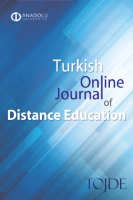
Turkish Online Journal of Distance Education
Advancing Innovations in Online Education.Turkish Online Journal of Distance Education, a distinguished publication from ANADOLU UNIVERSITY, serves as a vital resource in the field of distance education, contributing significantly to the ongoing discourse since its inception in 2000. With an impressive impact factor that reflects its standing within the academic community, this open access journal provides an influential platform for researchers, educators, and practitioners to disseminate innovative findings and educational strategies. Ranked in the Q2 category within the education sector according to the 2023 quartile rankings, and boasting a commendable position of #423 out of 1543 in Scopus' Social Sciences Education rankings, the journal places itself firmly within the 72nd percentile of its cohort. Spanning from 2004 to 2024, the journal's commitment to advancing scholarship in distance education is reflected not only in its comprehensive articles but also in its responsive engagement with contemporary educational challenges. Positioned in Eskişehir, Turkey, this journal aims to elevate discussions surrounding online learning and contributes to the global dialogue on education accessibility and innovation.

Journal of Information Technology Education-Research
Transforming Educational Landscapes with IT InsightsThe Journal of Information Technology Education-Research, published by the Informing Science Institute, stands as a pivotal resource in the field of educational technology and computer science. With an ISSN of 1547-9714 and an impressive E-ISSN of 1539-3585, this journal aims to disseminate high-quality research and innovative practices that enhance the integration of information technology in educational contexts. It has achieved commendable rankings, notably Q2 in Computer Science (miscellaneous), Q1 in Education, and Q2 in E-learning for the year 2023, reflecting its significance and impact in these domains. Within the Scopus metrics, it ranks #178 out of 1543 in Social Sciences Education and #50 out of 232 in General Computer Science, positioning it in the top percentiles of its fields. This journal is dedicated to fostering scholarly discourse and providing a platform for educators, researchers, and professionals to share their findings and insights, contributing to the advancement of knowledge and practices in information technology education. The journal covers research from 2011 to 2024, ensuring a comprehensive collection of contemporary studies that engage with current trends and challenges in IT education. For scholars seeking an open-access platform to disseminate their work, this journal presents an invaluable option to engage with a broad academic audience.